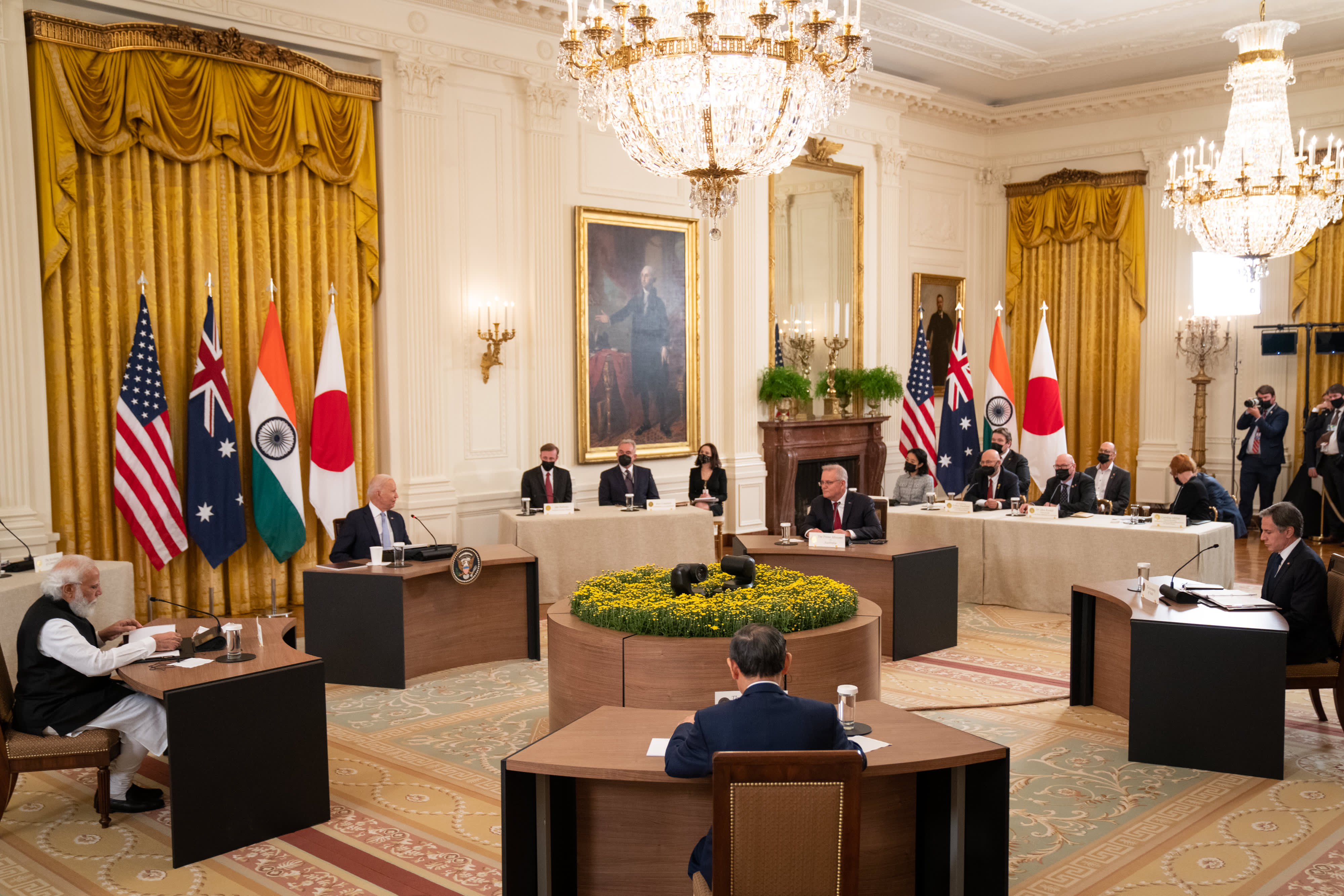
U.S. President Joe Biden hosts a Quad Leaders Summit along with Indian Prime Minister Narendra Modi, Australian Prime Minister Scott Morrison and Japanese Prime Minister Suga Yoshihide in the East Room of the White House on September 24, 2021 in Washington, DC.
Sarahbeth Maney | Getty Images
Without mentioning China, leaders of four large democracies — the United States, India, Japan and Australia — have reiterated their commitment to a free and open Indo-Pacific region that is “undaunted by coercion.”
U.S. President Joe Biden hosted the Quad Leaders Summit on Friday, where the prime ministers of India, Japan and Australia gathered in Washington, D.C., for their first in-person meeting.
“Together, we recommit to promoting the free, open, rules-based order, rooted in international law and undaunted by coercion, to bolster security and prosperity in the Indo-Pacific and beyond,” Biden, along with India’s Narendra Modi, Japan’s Yoshihide Suga and Australia’s Scott Morrison, said in a joint statement.
The statement did not mention China or its rising influence in the region, as the country grows more assertive in the much-contested South China Sea and East China Sea, and regularly patrols the waters there.
“We stand for the rule of law, freedom of navigation and overflight, peaceful resolution of disputes, democratic values, and territorial integrity of states,” they added.
The four countries have an alliance called the Quadrilateral Security Dialogue, or Quad, that positions itself as being committed to a free, open and inclusive Indo-Pacific.
‘Doomed to fail’
In some circles, the Quad is seen as an anti-China alliance in part due to Beijing’s increasingly aggressive moves in the East China Sea and South China Sea in recent years.
Quad members have taken part in joint naval exercises and stepped up defense partnerships with one another.
However, the group has shied away from explicitly mentioning China in its public statements, focusing instead on common issues such as Covid-19 and global health, infrastructure, and climate change.
More here: Read the full report on CNBC’s Quad project, including data visualizations, maps and a timeline
Still, Beijing’s presence remains an overhang.
China’s presence is palpable in all the initiatives that the Quad member states want to pursue, including vaccine diplomacy, infrastructure, technology cooperation and maritime security, said Harsh Pant, head of strategic studies program at the Observer Research Foundation in New Delhi.
“The idea is for these countries to provide the alternative to what the Chinese are trying to provide through their own model,” Pant told CNBC on Monday. For many smaller states in the Indo-Pacific, the current choice is between either pursuing China or nothing, he explained.
Beijing has an ambitious Belt and Road initiative designed to expand on China’s global influence by building out rail and maritime trade routes connecting the country with central Asia, Europe and Africa.
For its part, China thinks the Quad alliance is “doomed to fail.”
“A closed, exclusive clique targeting other countries runs counter to the trend of the times and the aspirations of regional countries,” Chinese foreign ministry spokesperson Zhao Lijian said in a press briefing Friday before the Quad leaders met.
“It will find no support and is doomed to fail,” he added.
New and existing initiatives
The Quad announced a number of new initiatives on Friday, and vowed to step up to existing commitments.
They include:
Covid-19 vaccines
U.S., India, Japan and Australia pledged to donate more than 1.2 billion doses of Covid-19 vaccines globally — that’s in addition to the shots the four countries already financed through the international vaccine access facility for low-income countries, known as Covax. India, one of the world’s largest vaccine producers, said it will resume exporting vaccines starting next month.
Quad infrastructure coordination group
The leaders announced a group that will coordinate efforts to build high quality infrastructure and provide technical assistance to regional partners to meet the Indo-Pacific region’s infrastructure needs.
Tackling climate change
Addressing climate change has been one of the major talking points for the Quad. The group announced several measures including forming a green-shipping network where major ports from each country would be invited to work together to reduce carbon emissions from the shipping value chain.
Critical and emerging technologies
With regard to critical and emerging technologies like 5G, the Quad announced plans to establish a semiconductor supply chain initiative to map and identify vulnerabilities and secure access to semiconductors and their vital components.
Space
The four countries plan to cooperate on space technology by setting up a new working group that will discuss ways to exchange Earth observation satellite data and analysis on climate change risks.




